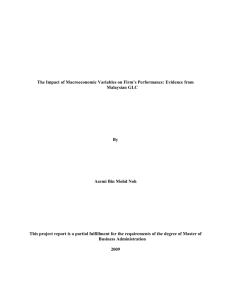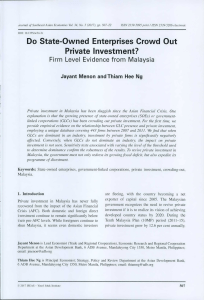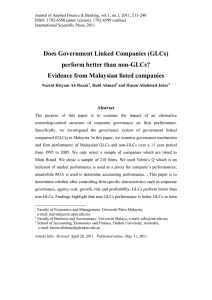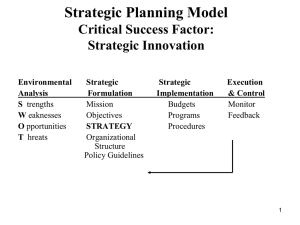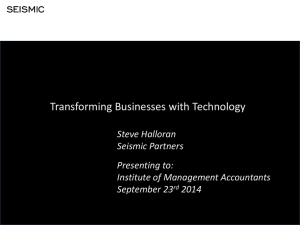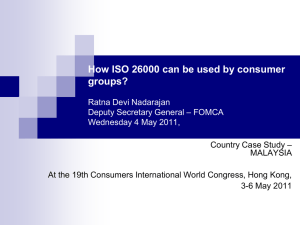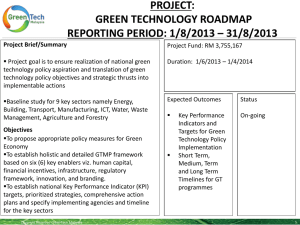(GLCT) Programme
advertisement
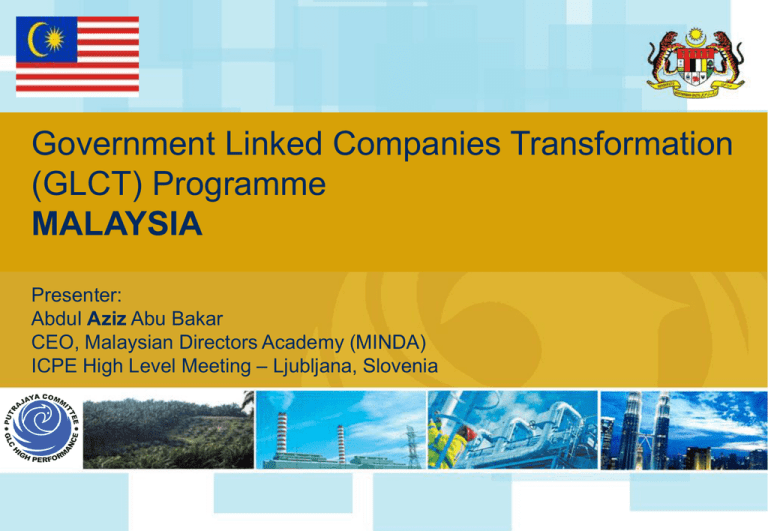
Government Linked Companies Transformation (GLCT) Programme MALAYSIA Presenter: Abdul Aziz Abu Bakar CEO, Malaysian Directors Academy (MINDA) ICPE High Level Meeting – Ljubljana, Slovenia 1 Sypnosis of GLC Transformation - Malaysia Government Linked Companies (GLCs) are an integral part of the Malaysian economic engine. They provide mission critical services, catalyse developments in strategic sectors and employ hundreds of thousands of workers. However, GLCs historically underperformed the broader Malaysian market, both financially and operationally, a trend that risk derailing our efforts towards Vision 2020. In 2004, we thus launched the GLC Transformation (GLCT) Programme with the dual aims of enhancing economic performance and accelerating the country’s social and economic developments. The journey to date has been challenging. We had to address old mentalities. We are already starting to see tangible results following the successful launch of all the 10 initiatives. We have built strong economic fundamentals, and improved GLC governance and transparency. We have increased our focus on Human Capital development. We have also seen the successful execution of turnaround programmes in situations once thought impossible. Vision 2020 is on the horizon…there is still much more to be done. 2 AGENDA 1. GLCT overview 2. Progress to date 3. The way forward 3 DEFINITION OF GLC - IN THE CONTEXT OF GLCT PROGRAMME • The Programme only covers GLCs held by Federal Level GLICs • GLCs are companies where - GLICs are either the majority or single largest shareholder - GLICs have ability to exercise and influence e.g. Appointment of Boards and Senior Management (via NRC) Nominee Directors of Ministry of Finance Inc. Remuneration and Benefits (KPIs based for EDs) Award of tenders and contracts (via Board) M&A, divestment, strategy, restructuring and financing, etc. Source: GLC Transformational Manual, July 2005 4 HISTORY AND EVOLUTION OF GLCs 1969 Maybank becomes government owned 1972 LTAT established 1979 Sime Darby is Malaysianised 1957 1987 Jabatan Telekom Corporatised 1983 1962 LTH established 1978 PNB established 1970 Launch of New Economic Policy (NEP) Malaysianised GLCs Value adding to Malaysia’s Natural resources 1997 Rapid economic growth and privatisation Industrialisation and moving up the value chain 1951 EPF established 1992 Malaysian Airport and Postal Department provatised 1985 Proton launch first model 1981 Launch of Heavy Industrialisation Programme 2005 2000 Financial Crisis 1994 KNB began operations 1994 1990 Lembaga Letrik Negara Corporatised Corporatised Providing Essential Public Services 1999 Bank Bumiputra merger with Commerce Bank 2002 MAS widespread asset unbundling exercise 1998 Danaharta established Recapitalised and Restructured Recovering from the Crisis Recovery and restructuring CURRENT GLCT Programme 2001 Financial Sector Masterplan announced Financial Institutions Becoming internationally competitive 5 GLCT Programme is driven by The Putrajaya Committee On GLC High Performance (PCG) Prime Minister as Chair Khazanah is PCG Secretariat PCG GLICs GLCs TH Plantations Berhad 6 GLCs ARE MAJOR CONTRIBUTORS TO THE NATION National workforce GLCs account for around 5% of the national workforce (400,000 employees) Approx. % to Companies listed at Bursa Malaysia Significant part of the economy 5% GLCs Approx. % contribution to Bursa’s total Market Capitalisation (USD 440 Billion) 36% 33 Public listed GLCs Mission critical service provider Telecommunications 95% Non-GLCs Transportation GLCs 64% Non-GLCs Banking & Financial Services Energy 7 GLC Transformation Programme is now in its 7th year 2004 2005 2006 Phase 1: Mobilisation, Diagnosis & Planning Phase 2: Generate Momentum 14 months 5/2004 12-17 months We are here 2007 2010 Phase 3: Tangible Results 2-5 years 2015 Phase 4: Full National Benefit 5-10 years onwards 1/2005 PCG formed 2004 Measures Key Performance Indicators (KPIs) Performance Linked Compensation (PLCs) Performance contracts Board composition reform Revamp of Khazanah GLC leadership changes 29th July 2005 Transformation Manual Launch Policy Guidelines Ten 2005/6 Initiatives Outcomes: Diagnosis of GLCs conducted Determination of Policy Principles Initial 2004 Initiatives launched 2005/2006 Initiatives implemented Full roll-out in place Key policies endorsed and executed upon Early fruits of sustainable improvements Maintain momentum Tangible & sustained benefits across GLCs Visible benefits to all stakeholders, e.g. customers, vendors, employees Large scale strategic and financial changes made Material changes to Boards Several regional champions Most GLCs performing at par with competitors 8 THE PROGRAMME IS BASED ON 3 UNDERLYING PRINCIPLES AND 5 POLICY THRUSTS UNDERLYING PRINCIPLES OF GLCT: 1.National development foundation 2.Performance focus 3.Governance, shareholder value and stakeholder management Policy Thrust 1: Clarify the GLC mandate in the context of National Development Policy Thrust 2: Upgrade the effectiveness of Boards and reinforce the corporate governance of GLCs Policy Thrust 3: Enhance GLIC capabilities as professional shareholders Policy Thrust 4: Adopt best practices within GLCs Supported by 10 overarching themes of initiatives (now commonly referred to as coloured books) Policy Thrust 5: Implementing the GLCT Programme 9 By 2006, all the 10 GLCT Initiatives were launched. 1 6 Enhancing Board Effectiveness (GREEN) Apr 2006 Reviewing and Revamping Procurement Practices (RED) Apr 2006 2 7 Strengthening Directors Capabilities (MINDA) Dec 2006 Optimising Capital Management Practices (PURPLE) Dec 2006 Enhancing GLIC Monitoring & Management Functions Dec 2006 3 8 Strengthening Leadership Development (ORANGE) Dec 2006 4 9 Improving Regulatory Environment (WHITE) Sep 2006 Intensifying Performance Management (BLUE) Aug 2005 Achieving Value Through Social Responsibility (SILVER) Sep 2006 5 10 Enhancing Operational Efficiency (YELLOW) Sep 2006 10 Why is GLC transformation needed? 11 Reason #1 They play a significant role in Malaysia’s economy 12 Reason #2 GLCs underperforming the market over past 15 years prior to 2005 13 Reason #3 Time to Vision 2020 is short (15 years left when GLCT started) 14 Reason #4 Increasing market liberalisation and competition 15 Reason #5 Malaysia is caught in the middle income trap 16 AGENDA 1. GLCT overview 2. Progress to date 3. The way forward 17 GLCT ASPIRES TO CREATE REGIONAL CHAMPIONS BY 2015 GLC Starting Point Domestic champion Regional champion [All GLCs by 2015] [Several GLCs by 2015] Global champion v5.0 v4.0 v3.0 v2.0 v1.0 GLCs Majority of Current GLCs Examples of Metrics for Success: Comparable to Top Domestic Peers Performance (e.g. Profitability, Growth, Market Share) Comparable to Top Regional Peers Scope (e.g. Geography, No. of Markets) Comparable to Top Global Companies Scale (e.g. Revenues) Capabilities (e.g. Operations, branding, etc.) Resilience (e.g. against systemic and non-systemic risk) 18 G20 AGGREGATE EARNINGS RM bn 17.3bn 17.8% annual growth rate since 2004 Compares favourably to: KLCI EPS growth rate of 6.5% GDP growth rate of 8% over the same period 9.6bn FY2004 FY2010 Source: G20 Financial Reports, Bloomberg Analyst Consensus Estimates and PCG Analysis 19 G20 MARKET CAPITALISATION RM bn 346 354 293 195 31 Dec 07 Source: Bloomberg 273 123% increase 172 159 159 14 May 04 293 273 346 31 14Dec May08 04 172 31 31Dec Dec09 07 15 Jun 11 29 31 Apr Dec 1108 31 Dec 09 29 Apr 11 20 G20 TOTAL SHAREHOLDER RETURN GREW BY A COMPOUNDED ANNUAL GROWTH RATE (CAGR) OF 16% OVER THE PAST 7 YEARS, OUTPERFORMING KLCI BY 2.1% G20 290 240 FBM KLCI 190 140 100 =14/5/04 90 May-04 Dec-04 Source: Bloomberg Jul-05 Feb-06 Sep-06 Apr-07 Nov-07 Jun-08 Jan-09 Aug-09 Mar-10 Oct-10 15 Jun-11 21 Turnarounds Transformation transactions Regional Growth 22 GLCs Have Brought Increasing Benefits To All Stakeholders • Over 6,000 unemployed graduates have benefited with 82% employability rate • 34 members adopting 222 schools, benefiting 110,000 students • BIMB, Boustead, Proton, UMW received best product awards • Axiata, CIMB, MAHB, MAS, Maybank, Pos, TM & TNB received best service provider awards • In 2010, 11.15% straight ‘A’s students from PINTAR schools vs National Average of 10.2%, an increase of 1.53% from 2009 • 4349 families have benefited across the nation Source: GLC reports Source: PCG, GLC reports COMMUNITY AND CSR GLCs BENEFIT ALL STAKEHOLDERS VENDORS AND SUPPLIERS • TM’s vendor IC Microsystem awarded Malaysia’s Top Most Innovative SME in 2010 with RM 1 Million grand prize • TNB organises trade mission to promote its vendors’ products overseas & more than 10 vendors have ventured into foreign markets to-date • Proton & CIMB collaborated to provide financial assistance to their dealers • >130 vendors graduated under Vendor Development Programmes since 2004 Source: GLC reports CUSTOMERS EMPLOYEES & HUMAN CAPITAL • Study on impact of GLCT on GLC Employees welfare of G20 employees improved since Programme began in 2004 • G-GLC Cross Fertilisation Programme 2nd Cycle, 32 participants cross assigned to increase public-private cooperation • GLC-GLC Cross Assignment Programme 3rd Cycle, 12 participants cross assigned to develop talent Source: PCG, GLC reports 23 AGENDA 1. GLCT overview 2. Progress to date 3. The way forward 24 INVEST MALAYSIA 2009 • The Govt. is committed to ensure GLCT continues to be implemented, if anything with greater urgency and focus • GLCs must aspire to greater heights, whether best in class or emerging as future regional if not global champions Source: Prime Minister’s Keynote Address at Invest Malaysia Conference 2009 25 Towards The New Economic Model (NEM) 1 Malaysia - People First, Performance Now Preservation and Enhancement of Unity in Diversity Government Transformation Programme (GTP) Economic Transformation Programme (ETP) Strategic Reform Initiatives Efficient Delivery of Government Services National Key Economic Areas 10th & 11th Malaysia Plan Roll-Out Macroeconomic growth targets & expenditure allocation Implementation of Government’s Development Programmes 26 5 ROLES OF GLICs AND GLCs IN THE NEW ECONOMIC MODEL (NEM) 27 But issues & challenges remain !! 28 The massive gap in talent, execution skills and capabilities at GLCs Source: GLCT Programme Mid-Term Progress Review, March 2009 29 Developmental vs commercial roles of GLCs ? Source: GLCT Programme Mid-Term Progress Review, March 2009 30 Continued & broader support from all stakeholders Source: GLCT Programme Mid-Term Progress Review, March 2009 31 Need to enhance public sector transformation in parallel with GLCT reforms Source: GLCT Programme Mid-Term Progress Review, March 2009 32 terima kasih ! 33
